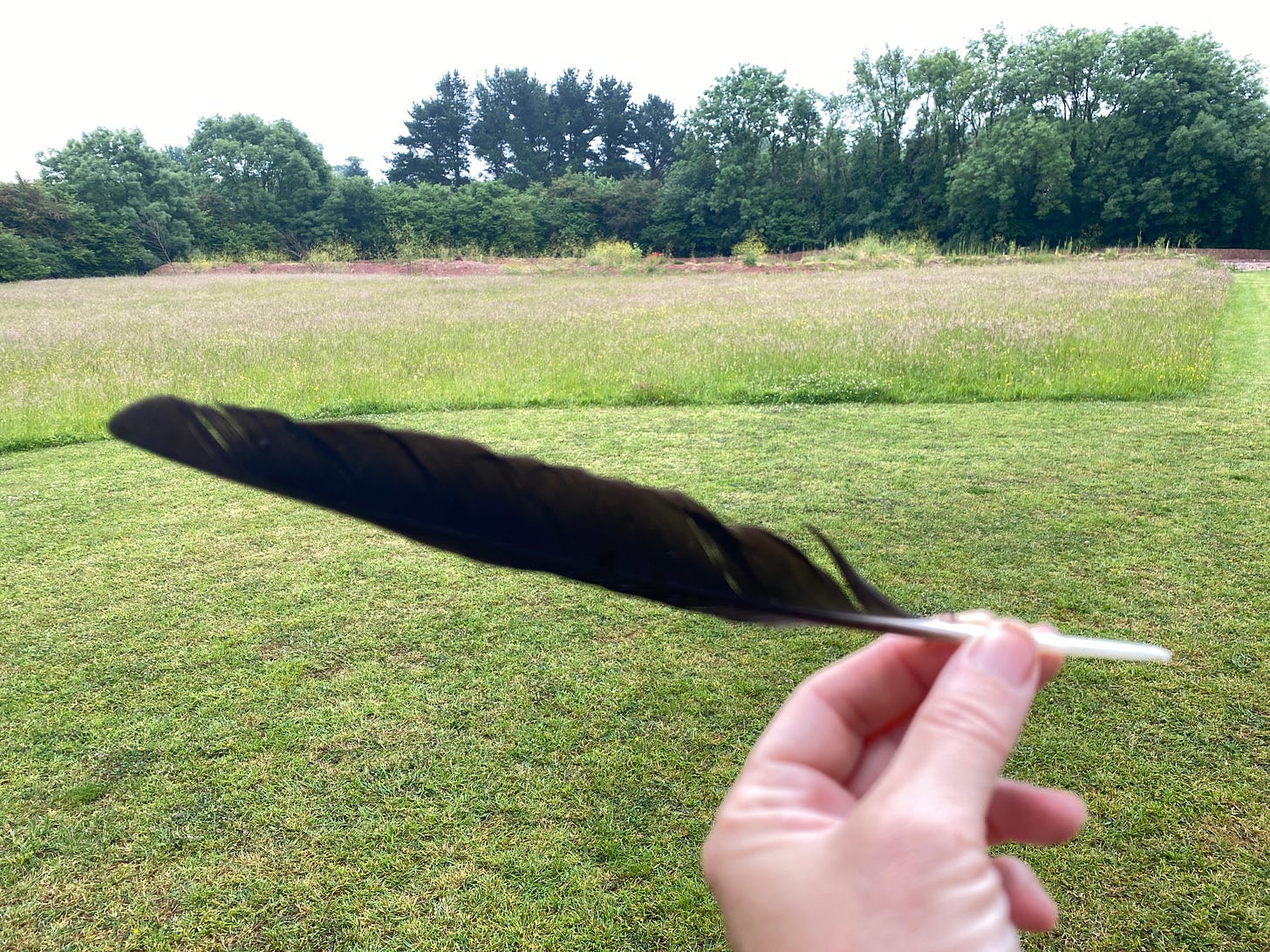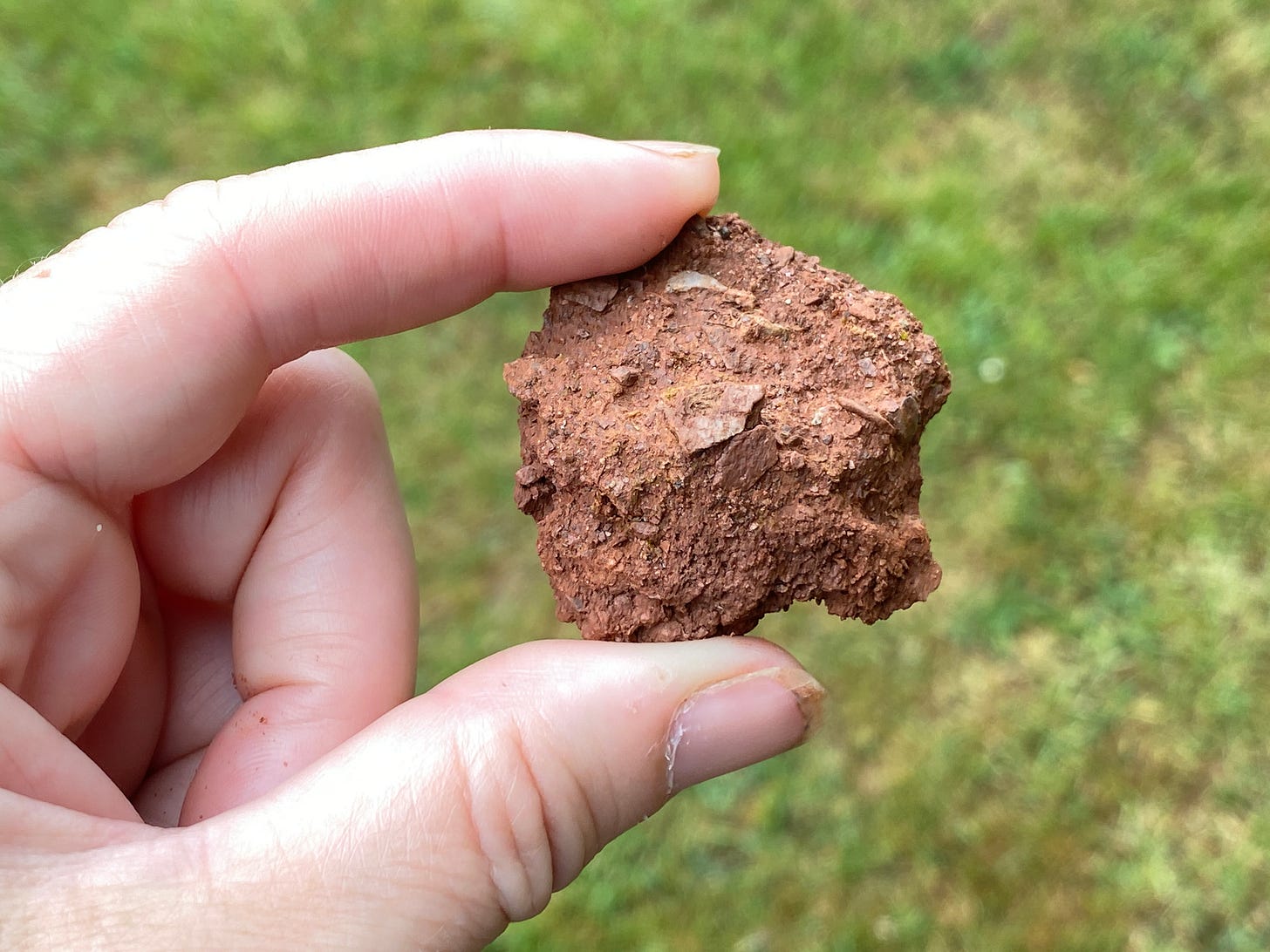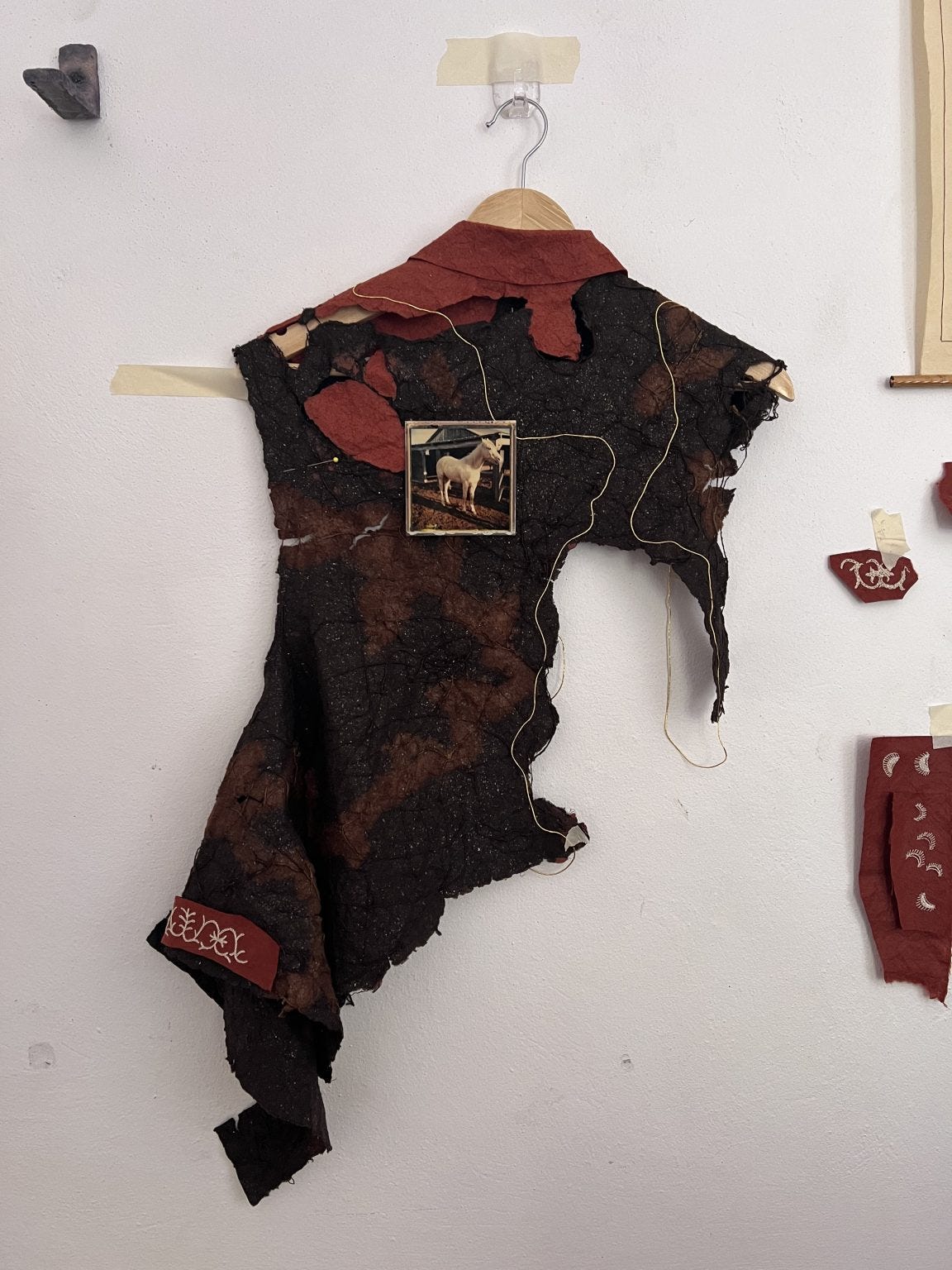Softness
the work of a lifetime
A change
Twenty feet outside my window, the chestnut, oak and pollard lime trees sway. For over a month this coast, whose trees habitually bow their heads and turn their backs to a prevailing sou’westerly, has experienced cold, insistent winds from the east. This happened last year, too. Despite the sunshine, whitecaps rise in the sheltered bays, swimmers huddle in the surf, eyeing their expensive Dryrobes, wistfully. I am sitting at my desk, facing west, feeling something shift - inside? Outside? Probably both.
Audio version
The trees can’t help but dance in the breeze and the neighbourhood’s young corvids are calling as they scoot by, new wings ruffled. I sympathise. For all my preening and smoothing down of its feathers, the strange bird of my heart is all squawk and flutter, like its going to be pushed out of my ribcage.
Unsure as to how to soothe it, I remember softness, and dive into the Tao Te Ching and my grandmaster’s writings. My heart turns to me as if to say, ‘Well then, that doesn’t look like safety,’ and puffs out its feathers again to seem larger, less like prey. ‘The way through this isn’t more defence, little one,’ I say to myself, ‘We’ve tried that, remember?’
This piece is my heart’s grudging nod of assent.
A judgement
‘Higher good is like water:
the good in water benefits all,
and does so without contention.’1
Twice in the last two months, men that I do not know well, (but whom I do respect and like), have noted how I seemed ‘overly insistent’ on points, when in animated conversation with them. Not one to miss a repeated message, I used it as a prompt to return to certain parts of my training which I have neglected, rather than as some kind of admonishment. In my tradition of T’ai Chi, nothing is considered greater than softness and yielding, and to say these qualities have transformed my life is like describing the Grand Canyon as quite a big gorge.
Firstly, you may be thinking, these people don’t know me well, perhaps they are over-sensitive and not used to a woman being assertive, or to robust verbal conversations. They may perhaps be stuck overly online behind screens and not used to the to and fro of forthright conversation which resumed in person after lockdown. This may be partly true, by their own admission. When I talk with all my dear friends2 particularly, we are ‘yes, and’-ing and interleaving our thoughts as quickly as they come, with not an ounce of rancour, just a playful swiftness. It reminds me of T’ai Chi pushing hands, in those glorious years with a classmate where we have worked together long enough to be able, with a nod and a smile, to increase the intensity without any change in the quality of warmth and care between us. But this is not all of it. Just because someone isn’t accustomed to a thing, doesn’t mean that how I was being was ideal.
Secondly, in my country right now, women around my age are regularly unlawfully prevented3 from gathering and speaking their minds about almost anything at all, so it is a very fine day indeed to be unimpeded as I speak with friends. One could argue that free speech, and the right to speak as we wish without censorship or ‘tone-policing’, is of utmost importance. It is. But this is still not the whole story.
Thirdly, the old chestnut: it is perfectly commonplace for a man to speak forthrightly in a conversation, but when a woman does so she is often judged as ‘hard’. This is sadly still true, and I reflected back to my local friend how everything he remarked about my speech was equally true of his. We laughed, and both took our gentle punches on the chin.
But here’s the thing, all of the above can be true, yet it is also true that I was not soft, not yielding, and was probably indulging in old habits of defence, as in the way I might reflexively hunch my shoulders and lower my head against the rain, yet get just as wet as had I stayed upright on the walk home. Good excuses make no dents in this. If I want to live life unguarded, I’ll have to remove my armour (yet again).
A danger
Q. “ What is the best thing that you hope readers could take away from your work?”
A. “That even if we're constantly tempted to lower our guard -- out of love, or weariness, or sympathy, or kindness-- we women shouldn't do it. We can lose from one moment to the next everything that we have achieved.”
Q. “Is there anything else you’d like to add?”
A. “No.”
- Elena Ferrante
Today saw more to-ing and fro-ing of another kind as I replied to people regarding certain ongoing matters. I was at the gym, working on resistance and weight training to trap calcium in my bones, much against its desire to flee and re-join the hard, limestone-infused water of my town. It is ironic that I must regularly resist, push back, firm my muscles and press weights to have any chance of staving off arthritic lameness and osteoporosis. The part of me that struggled for years to develop even a modicum of softness harrumphs like an annoyed teen at this latest about-face. ‘But you said so-oft! Now you’re saying ‘fir-irm’, make up your mind!’ Middle-aged Caro knows what needs to be done, and does it. I feel calm at the gym, even peaceful. I listen to Iain McGilchrist’s latest podcast while on the cross-training machine and laugh at myself, but I still do the physiotherapist’s designated 10 minutes at intensity number 5, because I love still being able to walk to the sea edge.
Remaining calm whist receiving emails to do with these serious matters is my current greatest challenge, my ‘big push’. If I harden to it, my heart rate soars and my mood darkens. If I let my heart expand and be a bit more spacious, there’s a chance I can ‘just be’ with it all until my fear softens. So, I know where my current tendency to hardness comes from, it’s not a mystery. When for a long time one has not been protected by those who by rights should have stepped in, and when a fight is on the horizon at any time, one adopts a defensive stance.
But hardness won’t work because it keeps out all the good as well as the difficult things, plus defensiveness makes enemies where there could be allies.
However, Ferrante is also correct. In certain contexts, one lapse of care, one unguarded communication, and ruin approaches. I know too much about this from experience and am paying for it now. Which is why there is always going to be a conundrum. This is a very human predicament and it is not a problem to be solved.
So where does this leave a writer who wishes to be truthful? Who is also a woman who wishes not to see her life pulled apart by strangers. Who is also a teacher for whom the communication of hard-won knowledge is almost a sacred duty.
That’s where softness comes in.
A softening
Softness is the dream in every ache to be a better soul.
The imagination cannot ready you for the experience of softness.
The word softness is often used to compare one thing to another.
For example, the greatest good has been likened to the softness of water,
trickling to every level and lacking the hardness associated with pride.
But relying on a comparison to understand an absolute is not just foolish, it is a waste of golden time.
- John Kells, Blakeney, 2006.
Uncertainty is the ground of life, it supports us if we rest into it. If we, too, offer up a yielding surface to life, if we allow it make an impression on us, as if on freshly fallen snow, (as my teacher memorably describes it), then we can really feel what is going on. I don’t have to jump to conclusions and defend myself, even unconsciously, if I put much more energy into connexion, and do not fret about being right, or heard, or understood. It’s nice to be right, and heard and understood, of course, but that’s out of my hands. I don’t need to use that story again, of how the world fell apart and the self dissolved to show how I have ‘done my work’. The work at hand is much less grand; it’s sitting in a coffee shop with another person, and us both not feeling there’s a war brewing.
A lot of this looks so much like forgiveness, that particular, grace-filled posture of the heart, which has gone out of fashion, like the Quickstep.
I am living my life backwards, it appears. Not physically, like Benjamin Button, but in relinquishing of the once necessary hardness I kept acquiring until my mid-thirties. I read that an average, unmolested, native oak tree in Britain spends 200 years growing, 200 years living, and 200 years ‘dying’. Those inverted commas are there because we dearly need a new word for this so-called dying, a process where unnecessary loads are dropped, energy is returned to the centre and the root, and the production of dense foliage at the periphery is swapped for the craggy generosity of offering a home to more than 400 kinds of bird, invertebrate, fungi, lichen, and numerous other beings. Within a whole forest ecosystem, this is sometimes referred to as ‘climax’. I prefer ‘maturity’.
I wonder, is it possible to yield to our conditioning so completely, that we are fresh to the world like a baby, but yet fully inhabiting our adult body and mind? This is the goal of traditional Taoist meditation and much Zen. I don’t know. I am drawn to be like the famous useless old gnarled tree of Chuang Tzu, playing host to worms, too strange a shape to be put to any use, and thus being allowed to live out my days in peace. This is wishful thinking, as I am making use of myself even now as I write to you.
In a moment I will set off by train to the memorial meadow-laying of a dear friend and old T’ai Chi student. How he was growing into his older age was tremendous to see and I am sad that his maturity was cut short by cancer. However, he found later love and creative partnership with his wonderful wife, who is now a friend and natural pigment colleague of mine. To have stayed with such a great team at their home several times, in what I would call the prime of their lives - unencumbered, practical, humour-filled - was a great inspiration. Their way is one of the reasons I have now softened to the possibility that I too may one day be half of such a partnership again, after a couple of years spent deliberately on my own. To let someone make such an impression on me, and me on him, that we can feel beyond the surface of things, and together attend to the welcome ache to be better souls.
All photos this week are from a field near Dartington, where I stayed overnight for my friend’s memorial.
This week’s good thing: Gabriel Rivera makes extraordinary art using paper pulp, traditional dyestuffs of Mexico, clothing and performance. His latest piece includes sculptures whose forms are inspired by the charro suit, the formal attire that Mexican cowboys wear during charreadas, or Mexican rodeos. His father, Bonifacio Rivera, was a charro and his suit was gifted to Gabriel after his passing over a year ago. You can read this latest piece in my series for Dark Mountain, Our Dark Materials here.
Tao Te Ching, Thomas Cleary Translation
Dear friends and family reading this, thank you for the space you make for us to be ourselves and to think freely together.
by violent mobs, no less.









Caro,
Girl, you slay me. It's quite clear to me, as I quickly approach my 67th bday, how and why I "turned out like this": fierce, tough, resilient, wirh no quarter for nostalgia. I went out into the storm of life around age 10, fleeing a dysfunctional parental home built on lies, gross neglect, wild rationalization + self-justification, delusion, abandonment, betrayal, disappointment, contempt, suicidal self-destruction, multi-substance addiction, depression, toxic hide-and-seek -- need I go on, really? Today, I am often criticized by female peers. (I do have to note the gender; my male friends don't voice their criticisms, which I am certain they also have.) Several of my lady friends find me "unsupportive" when I don't applaud and tirelessly VALIDATE their every move and decision. (Why do I even get a vote?) And yet. Like you, I marvel at every tremor and gleam of existence (Woolf). I do feel a spasm of...something?...watching the sunset. I know that there will be fewer and fewer such viewings for me. In work settings, I unflinchingly attack corporate mediocrity, and you can imagine how well that is received. Of course I love cashmere sweaters with no bra, skinnydipping, clean sheets, pussycats, pussywillows. I pick struggling earthworms out of rain puddles. And I do cook for hungry friends. I also find/give/cherish shelter from the storm to my love, Andrew: we've been together since I was 14 and he was 16 (a story of endurance, to be sure!). I think the gender issue, as you point out, makes this confusing. If I were to rock a cock, I'd be called scrappy and brave and brilliant. Now I'm just called a bitch.
I loved reading this earlier today and it is staying with me, thank you. I have many thoughts around being soft whilst at the same time not allowing myself to be squidged! Life has been a bit of a toing and froing with this for me!
However, the passage that gave me such comfort this morning is this; "........... ‘dying’. Those inverted commas are there because we dearly need a new word for this so-called dying, a process where unnecessary loads are dropped, energy is returned to the centre and the root, and the production of dense foliage at the periphery is swapped for the craggy generosity of offering a home to more than 400 kinds of bird, invertebrate, fungi, lichen, and numerous other beings. Within a whole forest ecosystem, this is sometimes referred to as ‘climax’. I prefer ‘maturity’."
This is just a beautiful description of post menopause for me and I will be sending it to all my post menopausal friends to contemplate.
I echo what Jane said and I really look forward to your wise offerings.